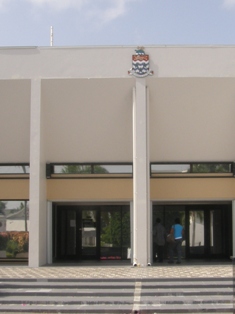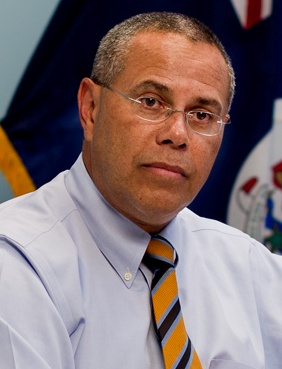
 (CNS): A witness who told the police four days after the murder of Omar Samuels that he had seen one of the defendants quarrel with the dead man on the night he was killed revealed he could no longer recall most of the events recorded in his statement when he appeared in court today. Marcus Manderson, who is an inmate at HMP Northward, said he could only remember what happened later that night when he found Samuels and tied up his injured leg. In contradiction to his original statement, he told the court that the dead man had revealed the name of his killer before he died. Manderson said that Samuels told him “Martin” had shot him and taken his gun.
(CNS): A witness who told the police four days after the murder of Omar Samuels that he had seen one of the defendants quarrel with the dead man on the night he was killed revealed he could no longer recall most of the events recorded in his statement when he appeared in court today. Marcus Manderson, who is an inmate at HMP Northward, said he could only remember what happened later that night when he found Samuels and tied up his injured leg. In contradiction to his original statement, he told the court that the dead man had revealed the name of his killer before he died. Manderson said that Samuels told him “Martin” had shot him and taken his gun.
In his original statement the witness had told police that when he saw Samuels at JahT’s he was bleeding, and when he asked if he had been stabbed Samuels replied, “No them man they shoot me, take away me gun.”
During the crown’s opening statement on Monday, Cheryl Richards QC, the solicitor general, that stated this witness had given a statement to police soon after the murder saying that Patrick McField, one of three men accused of killing Omar Samuels on 5 July 2009, had quarrelled with the deceased at Peppers Nightclub on West Bay Road.
However, when the witness came to the stand today, Wednesday 1 September, he stated that he could not remember anything that happened that night before he got to JahT’s in McField Square, where he found Samuels injured and tried to help him. He told the court that as he tied up Samuels’ leg he asked who had shot him and Samuels said it was Martin who shot him and took his gun. Manderson said that Samuels had asked him not to say anything to anyone as Samuels did not think he was going to die.
As Richards took Manderson through his statement, made only five days after the incident, he continually denied any recollection of the events of the night of 4 July and the early morning of 5 July, including going to Peppers night club, where he had said he had seen Samuels quarrel with McField both inside the club and outside in the parking lot.
Manderson said it was too long ago to remember and he was drunk. He agreed that the signature on the statement appeared to be his but he said he could not remember saying any of it or recall any of it happening.
Richards directed him to read the police statement and asked what had happened as she took him through it step by step, but the witness answered “I don’t recall” or “I can’t remember” over and over.
He denied being told to lie or that he had come to court with his own reasons for not telling the truth. Manderson insisted that he was now telling the “whole truth” about what he could remember but it was too long ago to recall what had actually happened or what he had said when he made the statement.
Manderson said all he knew was that he could remember seeing Samuels after he had been shot. “When I see him he told me to tie up his leg. Then Omar told me that Martin shot him and take his gun,” the prosecution witness told the court.
Asked why he did not tell the police at the time, Manderson said Omar had asked him not to. “I figured he’d probably told the police when he wasn’t dead,” he added. After Samuels died, however, Manderson said he was afraid as he did not know who this Martin was and he was still afraid for his life.
Under cross examination from McField’s defence attorney, Trevor Burke QC, the witness agreed the police had come looking for him and that he had not gone to the police himself. He also agreed that they had probably taken the statement from him when he was at his home. Manderson said he knew the police came to find him because other witnesses had reported seeing him with Samuels before he died.
Following the problematic crown witness, the solicitor general called two police officers, who confirmed the details of an ID conducted at George Town police station, where the crown’s eyewitness identified the three defendants, Patrick McField, Osbourne Douglas and Brandon Leslie Ebanks.
The two officers were followed by RCIPS Scenes of Crime Officer Zoan Marin, who revealed that the crime scene which she had processed was not the porch and yard area of the two storey house at McField Lane, as described by the crown’s eye witness yesterday as the scene of the fight and the subsequent shooting.
The officer said the shootingscene was near the laundry room and the alley between two apartments on the other side of the two storey house. She confirmed that she found five shell casings and fragments of what could be bullets in that area near two apartments, but no bullets or casings were found near the porch. She also confirmed that the area was very dark when she first arrived in the early morning hours and that she had required the assistance of the fire department to set up lights to assist her in processing the scene.
The trial of McField, Douglas and Ebanks continues in the grand court tomorrow with more witnesses for the prosecution.
Continue Reading

 (CNS): The Auditor General’s Office has refused to comment on how many government ministries and statutory authorities made the 31 August deadline for submitting their financial accounts for the year end 2009/10. CNS called the office on Wednesday morning and a spokesperson for the new auditor general said he would be making no comment as it formed part of ongoing work, which the office had said it would not discuss. The spokesperson stated that the situation regarding government’s accounts would be revealed in the auditor general’s annual government report, which would be published in December. As a result CNS has now submitted an FOI request.
(CNS): The Auditor General’s Office has refused to comment on how many government ministries and statutory authorities made the 31 August deadline for submitting their financial accounts for the year end 2009/10. CNS called the office on Wednesday morning and a spokesperson for the new auditor general said he would be making no comment as it formed part of ongoing work, which the office had said it would not discuss. The spokesperson stated that the situation regarding government’s accounts would be revealed in the auditor general’s annual government report, which would be published in December. As a result CNS has now submitted an FOI request.(CNS): A witness who told the police four days after the murder of Omar Samuels that he had seen one of the defendants quarrel with the dead man on the night he was killed revealed he could no longer recall most of the events recorded in his statement when he appeared in court today. Marcus Manderson, who is an inmate at HMP Northward, said he could only remember what happened later that night when he found Samuels and tied up his injured leg. In contradiction to his original statement, he told the court that the dead man had revealed the name of his killer before he died. Manderson said that Samuels told him “Martin” had shot him and taken his gun.

 (CNS): Following its first meeting, the Judicial and Legal Services Commission has already begun the recruitment process for a new high court judge and the position will be advertised, according to the commission chair, Dan Scott. He said the creation of the JLSC began a new system of recruitment for the judiciary as its members, along with other appropriate people, would form the panel to find the new judge. Although the chief justice is expected to offer input, Scott confirmed he would no longer be solely responsible for finding senior judicial staff. Scott also said the commission was drawing up a code of conduct for the judiciary and the public would have access to complain directly to the JLSC regarding the conduct of judges and other senior public figures working in legal services. (Photo Dennie Warren Jr)
(CNS): Following its first meeting, the Judicial and Legal Services Commission has already begun the recruitment process for a new high court judge and the position will be advertised, according to the commission chair, Dan Scott. He said the creation of the JLSC began a new system of recruitment for the judiciary as its members, along with other appropriate people, would form the panel to find the new judge. Although the chief justice is expected to offer input, Scott confirmed he would no longer be solely responsible for finding senior judicial staff. Scott also said the commission was drawing up a code of conduct for the judiciary and the public would have access to complain directly to the JLSC regarding the conduct of judges and other senior public figures working in legal services. (Photo Dennie Warren Jr)